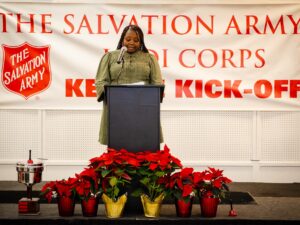The Salvation Army is known for its innovative rehabilitation and addictions recovery programs, showing that it’s not afraid to take the hard steps to help a person find freedom from their addiction. The programs are effective because they have trained personnel, qualified medical staff and compassionate chaplains who can walk with a person in his or her individual journey.
What if you find yourself sitting across from a friend or a community member who asks you for help with an addiction? What if the problem is one that is not readily accepted as an addiction—one that is certainly not talked about in public circles nor easy to admit struggling with? What if that addiction is pornography?
We each need to understand the science of addiction, the nature of recovery and the grace of God if we are going to successfully help others—or even ourselves—navigate the stormy waters of pornography addiction.
Current neuroscientific research demonstrates that our brains (the primary sex organ) are physically altered by the hormonal “high,” similar to the effect cocaine use has on the brain, experienced during sexual stimulation. Because of this, the manner in which the prior stimulation is achieved becomes the preferred form of sexual arousal. Soon, however, the dopamine effect lessens, causing the user to seek a “new” way to achieve the same effect, creating a spiraling dependency on pornography.
The nature of recovery is also not easy to grasp. It can feel like a really long journey but it still has to start with a small step. That first step is much easier to take for someone who has the reassurance of God’s grace and forgiveness.
What is that first step?
Acknowledge the problem exists.
Confess it to God and to someone else. The secret has to come out of the dark. Once this step of honest confession is taken, then healing, forgiveness and recovery can begin. This process must include the spouse or partner if there is one, but it can’t stop there. Many people feel guilt and know there is a problem and are struggling with actually changing the behavior. That is where the other steps play an indispensable role.
Be intimate with Christ.
According to Pure Hope, “Restoration and recovery is not just ‘behavioral modification,’ although certain compulsive sexual behaviors must stop. Rather, it is heart-level transformation and a renewing of the mind that is most essential.” Be immersed in God’s Word—and I mean, really immersed. Know the verses that promise deliverance and hope. If you are the one confided in, ensure the individual feels surrounded by the unconditional, unabashed, reckless love of God toward them, even in their weakness.
Find a counselor.
Your church leaders should know compassionate, well-trained Christian counselors with experience in this area who can assist a person in addressing wounds and core beliefs that form the root system of addiction. Trauma informed training and care can help leaders to be effective, especially if they avoid the trap that convinces people “all you need is Jesus.”
Get into a community.
Healthy support groups eliminate the isolation and secrecy that are the lifeblood of addiction, and provide the acceptance, understanding, structure and truthfulness the addicted individual requires. A well-known expression is “we’re only as sick as our secrets.” Again, it needs to be said—converting secrecy into transparency is fundamental to the journey out of bondage. It also provides accountability.
Internet filters are recommended for all computers and mobile devices. Despite this, over 75 percent of pastors admit that they do not ask for anyone to monitor their internet usage. Our choices of entertainment in private or in public can be triggers that can tempt us to sin. The healing journey will be accelerated once triggers are identified and measures taken to guard against these temptations. Consider your intake of movies, games and music and only consume what honors God, others and yourself.
Above all, if you are walking alongside someone in this addiction (or if you are looking at yourself in the mirror), remember that healing is a process. A person doesn’t become addicted overnight and shouldn’t expect to be healed overnight. There will likely be successes and setbacks, good days and bad days. The important point is to keep moving forward, not to give up. Philippians 1:6 is a powerful promise to stand on when the going gets tough: Being confident of this, that he who began a good work in you will carry it on to completion until the day of Christ Jesus.
Do Good:
- Find additional resources for pursuing a world free of sexual exploitation and brokenness at Pure Hope.
- Visit westernusa.salvationarmy.org to find The Salvation Army nearest you.
- Give to support the fight for good in your community.
- Join in the free Find Your Story course today and dive into the email workshop to find your voice, own your story and share it with others.













Comments are closed.